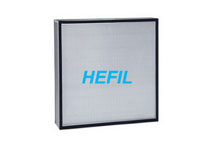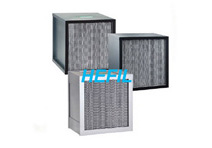Actually, HEPA is an acronym for "high efficiency particulate air". HEPA was a top-secret technology developed during the 1940s by the United States Atomic Energy Commission to efficiently filter radioactive particulate contaminants. Basically HEPA is a type of filter that can trap a large amount of very small particles that other vacuum cleaners would simply recirculate back into the air of your home. Filters meeting the HEPA standard have many applications, including use in medical facilities, automobiles, aircraft and homes. This is a brief introduction about what is HEPA.
HEPA filters are composed of a mat of randomly arranged fibers. The fibers are typically composed of fiberglass and possess diameters between 0.5 and 2.0 micrometers. Key factors affecting function are fiber diameter, filter thickness, and face velocity. The air space between HEPA filter fibers is much greater than 0.3 um. The common assumption that a HEPA filter acts like a sieve where particles smaller than the largest opening can pass through is incorrect. Unlike membrane filters at this pore size, where particles as wide as the largest opening or distance between fibers cannot pass in between them at all, HEPA filters are designed to target much smaller pollutants and particles.
HEPA filters are most commonly found in household vacuum cleaners and air filters. HEPA filters trap small particles that may cause problems for allergy sufferers and others with health problems. Reducing or eliminating those particles will make cleaner air for the residents of your home. Consumers can select air filters by looking at their efficiency in removing airborne particles from the air stream that passes through them. For an air filter installed in HVAC system ductwork, this efficiency is measured by its Minimum Efficiency Reporting Value, or "MERV." This measurement technique, developed by the American Society of Heating, Refrigerating and Air Conditioning Engineers (ASHRAE), allows the efficiencies of air filters supplied by different vendors to be compared.
What is HEPA? True HEPA filters have MERV ratings between 17 and 20; high-efficiency filters have MERV ratings ranging from 14 to 16; and medium-efficiency filters have MERVs ranging from 5 to 13. Most residential HVAC systems do not have sufficient fan or motor capacity to accommodate true HEPA filters. However, according to this EPA Guide to Residential Air Cleaners, air filters with MERV ratings between 7 and 13 may be nearly as effective as true HEPA filters in filtering most indoor airborne particles.
After learning the information as stated above, you must know the answer of what is HEPA. If you are looking for high quality HEPA, you can visit www.hefilter.com to get more information. Our company is specialized in manufacturing air filters for industrial, commercial and residential applications. You can find your idea filters.
Related Products You May Interested: Cleanroom air filters | fiberglass air filters





